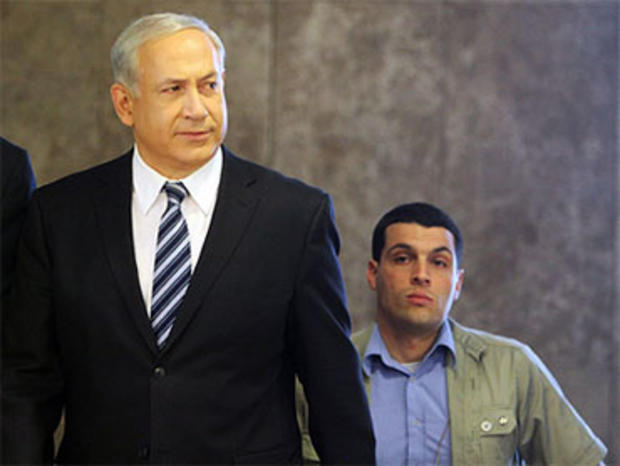Obama Pushing U.S.-Israel Alliance to the Brink?
Foreign policy analysts who constantly take the pulse of America's alliance with Israel are using the word "crisis," and some believe that President Obama seems intent on making it even more bitter -- not less -- in what seems like an effort to change the government coalition in Jerusalem.
Trying to meddle in a foreign country's internal politics is like playing with fire, but in the cause of pushing for progress toward Israeli-Arab peace it looks to many as though Obama is brandishing a big box of matches and a large jerrycan of gasoline. Instead of calming suddenly choppy seas between Washington and Jerusalem, he is demanding that Israel instantly make some concessions that Prime Minister Benjamin Netanyahu may consider politically impossible.
The State Department spokesman, P.J. Crowley, today confirmed that Secretary of State Hillary Clinton asked Netnayahu for specific commitments - but Crowley refused to say what is being requested. This follows the annoying timing of Israel's government announcing an expansion of a Jewish neighborhood in the captured eastern half of Jerusalem -- just when Vice President Joe Biden was visiting Israel last week.
One of the most powerful lobby groups in Washington, the American Israel Public Affairs Committee (AIPAC), is practically declaring an emergency. It sent more than 100,000 members an e-mail blast on Sunday that sought to shift the blame onto Washington: "The Obama Administration's recent statements regarding the U.S. relationship with Israel are a matter of serious concern. AIPAC calls on the Administration to take immediate steps to defuse the tension with the Jewish State."
A more left-leaning, mostly Jewish lobby group called J Street issued a very different statement that said the Obama Administration's annoyance is understandable. J Street is calling on the White House to be more explicit in framing possible future borders for an independent state of Palestine.
As soon as tomorrow, Obama's Middle East mediator, former senator George Mitchell, is to launch a new round of talks - though not face-to-face - between Netanyahu and the Palestinian leader in the West Bank, Mahmoud Abbas.
According to senior Israeli sources, the Obama administration is demanding that Israel take some steps that Netanyahu would find difficult if he is to keep key right-wing political parties in his coalition:
1.) Fully explain why the housing announcement was made while Biden was in Jerusalem, and take bureaucratic steps to ensure that top-level U.S. officials are not similarly taken by surprise in the future.
2.) Declare that talks with the Palestinians should quickly turn to the deepest issues: refugees, borders of a new Palestinian state, Jerusalem's status, how to share water, the fate of settlements, and future rights for refugees.
3.) Make a major gesture to Abbas, aimed at strengthening Yasser Arafat's highly challenged successor, such as the release of hundreds of Palestinian prisoners.
4.) Reverse the decision to approve 1,600 new housing units for Jews in East Jerusalem.
Looking closely at that list - as Israeli officials are surely doing -- it seems that if Netanyahu is to preserve his coalition he could perhaps acceptably answer #1, dance around #2, surely go along with #3, but never agree to #4 because Israel annexed the parts of Jerusalem it captured in 1967 and insists that the whole city is the Jewish State's capital.
A religious Jewish party named Shas would bolt. New elections might be required.
Few tears would be shed in official Washington if Netanyahu is forced out. It does not seem that he has gotten along warmly with Obama, certainly nothing like George W. Bush's warm friendship with Ariel Sharon, and the extent to which they agree on how to confront Iran's nuclear program remains veiled in ambiguity.
Netanyahu might not fall from power, if he backs off on Jewish construction in East Jerusalem. Perhaps the Shas party and other right-wingers would leave the coalition, but a larger moderate party - Kadima - might join and preserve Netanyahu's majority in the Knesset (the parliament).
Kadima was established by Ariel Sharon, the former prime minister who has been in a coma for over four years. Its leader now is Tzipi Livni, the former Mossad spy who got along well with Washington during her time as foreign minister.
Middle East timing often brims with irony, and on the calendar now is the huge annual policy conference of AIPAC -- to bring more than 5,000 big American fans of Israel to the Washington, D.C. convention center starting this coming Sunday. On the agenda for March 22 are two keynote speakers: Secretary Clinton and Benjamin Netanyahu. The prime minister will fly in for a very brief visit to mend fences and deliver a pep talk to American Jews and Israel's supporters in Congress.
CBS News correspondent Dan Raviv is based in Washington, where he hosts radio's CBS News Weekend Roundup. He is also co-author of books including Friends In Deed: Inside the U.S.-Israel Alliance.
